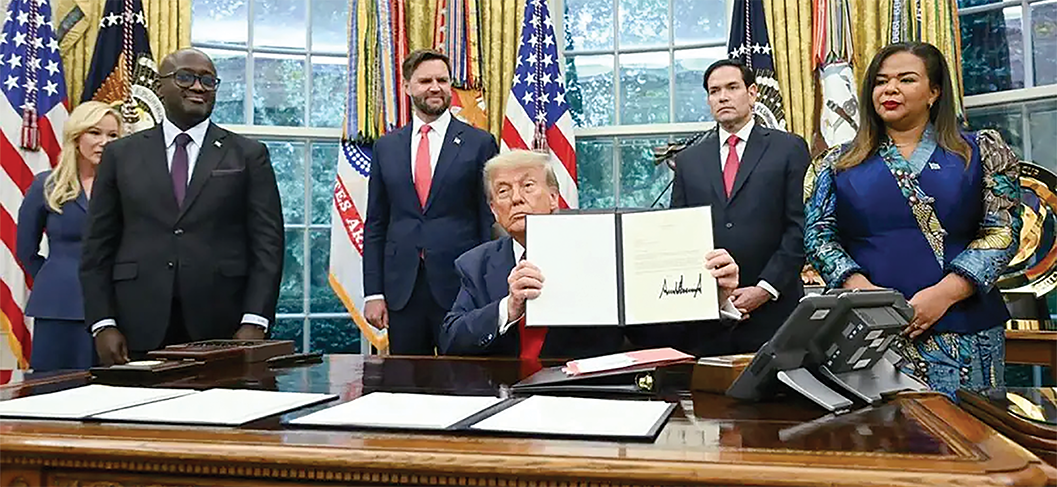INTERESTS: The United States has brokered a peace agreement between Rwanda and the Democratic Republic of Congo. But the deal prioritises America’s access to Congos’s minerals over the well-being of Congolese citizens, and sacrifices justice…
By Evelyn Namakula Mayanja
In March 2025, President Félix Tshisekedi of the Democratic Republic of Congo (DRC) offered the country’s critical mineral reserves to the United States and Europe in exchange for security and stability.
At the time, the March 23 militia insurgency (M23) was unleashing violence, killing civilians, committing sexual violence, displacing communities and looting mineral resources.
Since 1996, Eastern Congo has been engulfed in wars and armed conflicts driven by regional powers and more than 120 armed groups.
The US-brokered peace agreement between Rwanda and the DRC raises critical questions: Is this a genuine path to sustainable peace, or a continuation of US President Donald Trump’s strategy to secure access to critical minerals through coercive diplomacy?
The global shift toward renewable energy, digital infrastructure and military modernisation has sparked a geopolitical scramble for critical and rare earth minerals.
In early 2025, Trump signed a series of executive orders that introduced aggressive and imperial-style tactics to secure access to mineral wealth. He threatened Canada with annexation and tariffs, demanded access to Greenland’s resources and linked US support for Ukraine to access to its mineral reserves.
The DRC’s offer must be viewed through this lens of global resource competition.
The DRC holds some of the world’s richest deposits of critical minerals and metals. A 2012 article estimated the value of Congo’s untapped mineral wealth at US$24 trillion, a figure nearing the US first-quarter 2025 GDP of $29.962 trillion. The DRC produces 70 per cent of the world’s cobalt, ranks fourth in copper, sixth in industrial diamonds and also possesses vast reserves of nickel and lithium, including the Manono deposit expected to yield 95,170 tonnes of crude lithium.
But the struggle to control these resources has fuelled a cycle of armed violence, displacement and exploitation. Despite several peace agreements, peace and stability remain elusive.
US involvement in Congo stretches back to the Cold War, when it played a role in the 1961 assassination of Patrice Lumumba, Congo’s first elected prime minister who sought economic sovereignty.
In 1996, the US was accused of backing Rwanda and Uganda in the initial invasion of eastern Congo. A U.S. diplomat, “Mr. Hankins”, was quoted in Goma saying: “I am here (…) to represent American interests.”
In 2024, President Joe Biden met Tshisekedi to advance the Lobito Corridor, a strategic trade route to counter China’s dominance in the region. Chinese companies currently control around 80 per cent of Congo’s copper market. When Trump signed the 2025 peace agreement, he openly stated the US would gain “a lot of mineral rights, (…) foreign trade and investment from the regional critical mineral supply chains”.
The deal, however, prioritises America’s access to minerals over the well-being of Congolese citizens.
Historically, Congo’s mineral wealth has enriched elites and foreign powers while leaving its people impoverished and vulnerable. The new agreement could entrench existing inequalities and inflame tensions further.
The US has also cut off aid for war survivors, including emergency medical kits and antiretrovirals for rape victims, undermining humanitarian efforts. Crucially, the agreement overlooks:
• The root causes and drivers of conflict at national, regional and international levels.
• The role of Rwanda and Uganda, whose militaries and intelligence services have long been implicated in supporting groups like M23. General Muhoozi Kainerugaba, son of Ugandan President Yoweri Museveni, has referred to M23 as “our brothers” and threatened military action in Congo.
• The voices of Congolese civil society, war survivors and the public, who were excluded from the negotiation process.
• State fragility and institutional collapse – major enablers of protracted violence.
• The grievances of Hutu and Tutsi communities in the DRC, deeply rooted in colonial and regional politics.
• The presence of more than 120 armed groups, many of them proxies for foreign powers engaging in what some scholars call “geocriminality”.
Between January and February 2025 alone, more than 7 000 people were killed in the DRC. The United Nations and several human rights organisations have documented mass atrocities, including crimes of genocidal magnitude.
The peace agreement fails to demand justice for crimes committed against the Congolese people. Nobel Peace laureate Denis Mukwege condemned the deal for “rewarding aggression, legitimizing the plundering of Congo’s natural resources, and sacrificing justice for a fragile peace”. It also ignores the roles of international mining corporations and external entities that have long profited from Congo’s instability.
True and lasting peace in the DRC cannot be imposed from the outside. US-led mineral extraction without justice risks deepening the crisis. Since 1999, UN peacekeepers have been deployed in Congo, yet violence continues. Sustainable peace will require:
• An end to impunity;
• Thorough investigations into war crimes;
• Regional truth-telling processes;
• Justice and reparations for victims; and
• And most importantly, inclusion of Congolese voices in shaping their future.
Without these commitments, the US risks replicating a long history of exploitation, trading in minerals while ignoring the human cost. – The Conversation
* Evelyn Namakula Mayanja is an Assistant Professor at Carleton University in the Institute of Interdisciplinary Studies. She teaches courses on political repression and human rights. Her research focuses on natural resource extraction, peace, security and development in Africa
Comment
MENTAL PATIENTS SHAMED
Almost ten years after the Life Esidimeni tragedy that culminated in the death of 144 mental health patients in Gauteng, almost a similar incident has also emerged at the Robert Mangaliso Sobukwe and Northern Cape Mental hospitals where systemic failures and infrastructure breakdowns had resulted in some psychiatric patients dying due to neglect and extreme cold weather conditions.
A damning report by Health Ombud, Professor Taole Mokoena, which also involved the Human Rights Commission this week, revealed the horrible state of affairs at these hospitals where there was also an acute shortage of staff including doctors and nurses and patients were denied the quality of service they deserved. Patients’ rights were violated due to overworked staff. The report followed investigations that were initiated by Health Minister, Dr. Aaron Motsoaledi in October, 2024. The hospitals were also subjected to prolonged electricity blackouts as a result of rampant cable theft and destruction of the electrical substation by thugs. This exacerbated the already dire situation and resulted in nurses and doctors working in the dark for months using torches from their cellphones to perform their duties.
Electricity – controlled doors were also kept ajar at most times with heavy objects, a move that compromised the safety of both patients and hospital staff because of lack pf electricity. According to the report the health institutions also had leaking roofs, broken windows and blocked sewage systems.
At least two patients lost their lives due to extreme cold exposure and inadequate medical care. Another suffered a stroke attributable to extreme hypothermia – a medical emergency that occurs when the body loses heat faster than it can produce it. A patient also died after suffering from pneumonia. Some of these tragic cases followed negligence by certain staff members.
This is appalling. Caring for patients is a fundamental aspect of healthcare. Patients are taken to hospital to receive medical treatment that could help them recuperate, not to be abused. It is also the responsibility of the government to ensure that patients, especially at public health institutions, received the quality care they deserved. Chairperson of the Portfolio Committee on Health, Dr. Sibongiseni Dhlomo was spot-on when he stated that mental health was of paramount importance and must always remain under public scrutiny.
The painful situation at the two hospitals has exposed the lack of proper leadership resulting in lack of discipline. There were still medical staff members in their midst who cared less about human lives despite the tragic events of Life Esidimeni in Gauteng where the change in their providers culminated in the death of 144 mental health patients.
Dr. Motsoaledi must be commended for swiftly probing the shameful acts at the two Northern Cape hospitals. He has also announced a total R6,7 billion that had been allocated to address the healthcare problems that could help, amongst others, employing more doctors and nurses . He has also indicated that he could refer some of the staff members, fingered for dereliction of duty, to the relevant health authorities for professional misconduct. Health workers, including nurses, have the opportunity to help a patient recover quickly through proper care. Patients may forget your name but they would never forget how you cared for them .





























